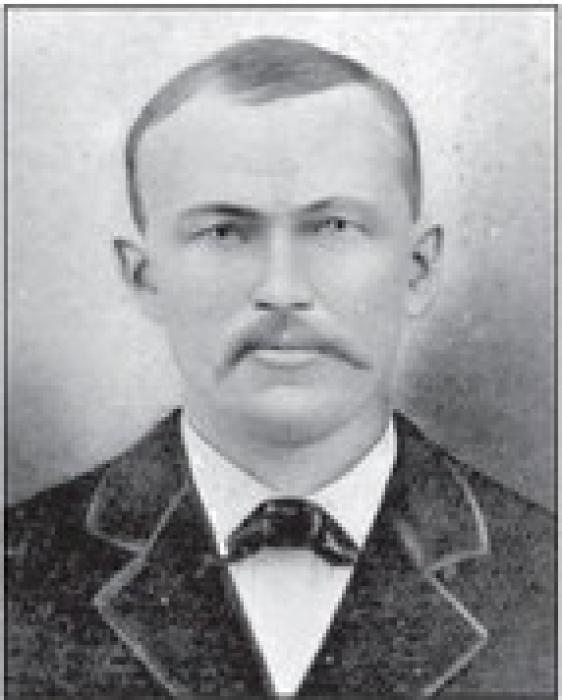Footprints
Many people think Cinco De Mayo is Mexico’s Independence Day. It is not. It is a celebration held on May 5th in commemoration of the Mexican victory over the French at Pueblo in 1862. By way of explanation, in 1861, the French invaded Mexico and defeated the Mexican army. Napoleon III, the emperor of France, placed Maximillian I (who was the brother of Franz Joseph, Emperor of Austria-Hungary) as ruler of Mexico. The French army, along with paid mercenaries, were defeated on May 5, 1862. Maximillian was executed. Sometime after the war, three members of Maximillian’s army (who were Czech) came to Fayette County and settled in Dubina. They were Matus Konvicka, Ludvik Svacina, and Joseph Lebeda, Sr. All three of these individuals are buried in Dubina. Here is a firsthand report from one of the survivors.
My name is Joseph Lebeda. I was born in the town of Ceska Dobris in Praha County. In 1864 people in Bohemia started to be hired for Maxmilian, the emperor of Mexico. Every volunteer was told to get 25 “zlaty’ch” if he was hired and that after 6 years of service, he would get 9 “lochei” of land.
After I joined the service, we were sworn in by promising loyalty to the emperor on land and on the ocean. We were sent to Ljublan, Jugoslavia to learn how to use guns. There I spent five months until the other soldiers from Austrian countries were gathered.
We were about 7,000 soldiers which were divided into light cavalry and artillery. I belonged to the cavalry. At the beginning of December, we came to Terst, Italy. There we loaded the ships. On December 15, we set out across the Atlantic on four ships.
We landed in Vera Cruz on January 29th ,1865 where we immediately received uniforms and guns. We each got 60 bullets, a bayonet, and a saber. We were sharpening swords and spears. After only four days we left to the battlefields and on the seventh day we already had to fight. Luckily, we won the battle and went on to the capital where Maximillian lived.
We stopped before reaching Mexico City. The next day the emperor and his wife came to welcome us. With us came three music groups: one Czech, one French and one Belgium. After the emperor looked at us, he said that we were good soldiers and fighters, that he is satisfied with us and that he will reward us in the future.
Here we stayed for two months. The second month we searched the forests for bandits but were unsuccessful because what we caught were two old women and two French refugees. Then we returned to Mexico City where we stayed for seven months, doing nothing. Later we went to pickup captured rebel officers in Orisaba whom we took to Pueblo.
After a few days we saw all these officers being freed. They told us that they were freed because they had bought their way out and had promised not to fight against Maxmilian anymore. Soon after that, the officers returned to the rebels. They were redeemed the money they gave to the emperor to be freed. The officers were leading the rebels to many new battles against Maxmilian.
In May of 1865, we went with the emperor’s wife toVera Cruz, where she took off for Europe. We also took off on a ship, the 2nd and 4th company. With us went officer Koudelic. The third day we reached the port of Bagdad.
Then we floated to Matamoros where we spent two months. When Bagdad was overtaken by the rebels, we had to march there at night. We had to fight with black men. We won and chased them all to the Rio Grande River where most of them drowned.
After that we returned back to Matamoros where we didn’t do anything for the next seven months. On June 7th, 1866, we took off in freight wagons and went to Monterrey. Now we were 3,000 soldiers. The first day was easy, but the next days we fought every day in small scrimmages. Because we suffered from lack of water, each day we lost six to eight men due to dehydration. On June 16 at 4 a.m., we met General Oiberi with his rebels. After a two-hour fight, we lost the bloody battle. We could not bury all the scattered corpses which lay on the battlefield because the rebels put us in prison, took away our uniforms, leaving us in underwear. They locked us in a cattle yard in Camargo. General Eskobedo told us to behave and wait for our liberation. They gave us only water and after three days, they took us further.
On the way, we were getting only one biscuit per day. After few days, we stopped at a small village and stayed in a cattle yard again. We were given one pound of meat per day without any salt or bread, and no water. We baked the meat on fire without any dishes available. We spent 45 days like that. Then they rushed us to Monterrey. This trip was horrible because we were barefoot and exhausted and emaciated.
In Monterrey, we were welcomed with music and bells ringing. They led us down the streets of the city. They locked us in the fortress. As prisoners, we had to sweep the streets for four weeks. We also were making bullets. After they got tired of us, they sent small groups to different places. I and 30 more soldiers went to Dimaris, 40 miles from Monterrey. We worked in a sugar factory and were paid 50 cents a day, not including meals.
Our imprisonment took eight months. Then one Mexican and one German officer came and wrote down our names. 147 of us wanted freedom and to stay on the American continent. Three of us decided to return to Europe. We received the certificates and were released, but we didn’t get any money. I decided to go to Monterrey. I found a job as a coachman and was paid $6.00 a month. In April of 1867, I headed for Texas. The trip to Austin took 45 days. I worked for an American who hauled goods for the army, getting $10.00 a month. I was also looking for Czech people there. A German man told me that many of them lived around Fayette County.
I found my countrymen happily and worked for Mr. Novak for $10.00 a month. Then I got sick and lost my job. After I recovered, I found out there is no future in being single and I got married soon. I established my home and family among my people. I’m still living here, considering myself being content and happy.
Joseph Lebeda, Sr. spent the rest of his life in Dubina. He died August 1911. Matus Konvicka died August 27, 1900. Ludvik Svacina died February 5, 1901. All three of these pioneers are buried in Dubina.
An interesting side note – while in Mexico, the Czechs and Germans helped to develop the Mexican beer industry. As a matter of fact, there is still a beer brewed in Mexico called Bohemian Beer.
Taken from the Amerikan Nardni Kalendar of 1880.





